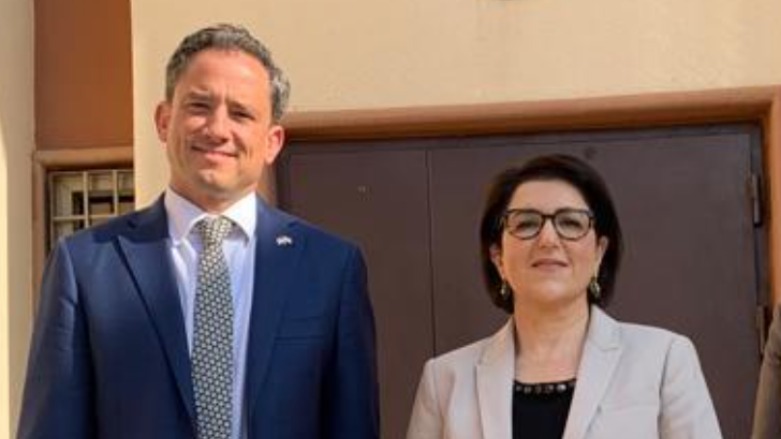US, KRG hail ties; stress mutual benefits

WASHINGTON DC (Kurdistan 24) – On Thursday, the Representative of the Kurdistan Regional Government (KRG) in Washington, Bayan Sami Abdul Rahman, met with Robert Palladino, the US Consul General in Erbil, who has briefly returned to the US for the holidays.
The two envoys “discussed the ways to further strengthen the US-Kurdistan strategic partnership in a way that benefits all sides,” the KRG’s press release on the meeting explained.
“They also exchanged views on further assisting and encouraging American companies to do business and invest in the Kurdistan Region, as well as promoting entrepreneurship,” it continued.
Palladino also visited the US Chamber of Commerce on Thursday, where he discussed “plans and ideas to grow US business activity in the Kurdistan Region,” according to a tweet from Steve Lutes, who covers the Middle East for the Chamber.
In the meeting between Abdul Rahman and Palladino, they “highlighted the role of the Kurdish-American community in forging and developing cultural bonds between Kurdistan and America,” the KRG statement said.
Last month, the first Kurdish Diaspora Conference was held in Erbil. Presumably, it will become, among other things, an effective complement to the work of the official Kurdish representation in Washington.
Read More: Erbil hosts conference to unify voice of Kurdish diaspora
Palladino, Abdul Rahman on the Strength of US-Kurdish Relations
“I much appreciated the opportunity to catch up with the KRG Representative, Bayan Sami Abdul Rahman, and review US-Kurdish relations after my first six months in the Kurdistan Region of Iraq,” Palladino told Kurdistan 24.
‘It has been a wonderful posting, and I’m most grateful for her partnership in developing our ties,” Palladino continued, as he concluded, “The USA and IKR are truly better together.”
Similarly, Abdul Rahman told Kurdistan 24, “It was good to see Consul General Robert Palladino, who has become so well-established in Kurdistan.”
“Our meeting was another step in what is a constant and ongoing process,” she continued, “to which all members of the KRG’s Foreign Relations Department are committed: strengthening the US-Kurdistan strategic partnership, along with strengthening our business and commercial ties for the benefit of both parties.”
Indeed, the Biden administration views the ties between Washington and Erbil in warmer, more elevated terms than any previous US administration. When Abdul Rahman spoke of the “strategic partnership,” she was echoing a term first used last spring by Brett McGurk, National Security Council Coordinator for the Middle East, and Dana Stroul, Deputy Assistant Secretary of Defense for the Middle East.
Read More: Biden administration: We have a ‘strategic partnership’ with the Kurdistan Region
Joe Biden is the first US president to have had a close personal relationship with the Kurds before assuming office. That stems from his long role, over many years, as a member of the Senate Foreign Relations Committee (SFRC.)
In late 2002, in his capacity as chairman of the SFRC, as the Bush 43 administration prepared for a war to oust Saddam Hussein and his regime, Biden visited Erbil to ready the Kurdish leadership and coordinate with them.
Subsequently, Biden became convinced of the need for decentralization in Iraq, so that each major population would govern their own affairs. Along with Sen. Sam Brownback (R, Kansas), who chaired the SFRC’s Middle East subcommittee, Biden sponsored a bipartisan, non-binding resolution calling for a decentralized, federal system, with three autonomous regions, in accord with Iraq’s 2005 constitution: Kurdish, Sunni Arab, and Shi’a Arab.
In 2016, when Biden was Vice-President, and as the Peshmerga, backed by the US-led Coalition, fought against ISIS, Biden returned to Erbil.
In late 2017, this reporter chanced to see Biden at a local grocery store. In hindsight, he was already running for president, as he was extremely pleasant to the crowd that gathered around him. After all, as a former vice-president, he was under no obligation to answer people’s questions, including mine—which was to challenge him on how the Obama administration had dealt with the Kurds.
“Masoud Barzani is a good friend of mine,” Biden responded. “And I wish we could have done more for them.”
“Why didn’t you?,” I asked. “Turkey,” he replied.
Read More: Joe Biden—‘Good Friend’ of Masoud Barzani—becomes America’s 46th President
Surely, something of that spirit—developed over years between figures like Joe Biden and Masoud Barzani—underlies the cordial discussion on Thursday between the US representative to the Kurdistan Regional Government in Erbil and that Government’s representative in Washington, while the former was home for the holidays.
